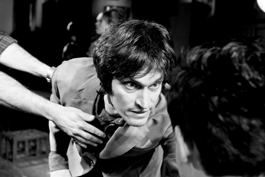home | metro silicon valley index | movies | current reviews | film review

IN YOUR FACE: Vincent Gallo ratchets up the intensity in 'Tetro.'
Lone Wolf
The hero of 'Tetro,' just like director Francis Coppola, feels spurned by muses and critics alike
By Richard von Busack
THE SUMPTUOUS but very strange self-made film Tetro is at times an unsuccessful wine pairing: a sophisticated rich Coppola served with an inferior Gallo. Francis Ford Coppola's new work is set in Buenos Aires. Bennie (Alden Ehrenreich), a young and virginal sailor—a waiter on a cruise ship—descends on his long-lost half-brother (Vincent Gallo), who abandoned him in New York. Their mutual father is a renowned and much-married orchestra conductor (Klaus Maria Brandauer). In rejection, the older brother has changed his name to Tetro.
This broken-legged lone wolf winds his way through a series of cafes, having written off the writing life. His adoring wife, Miranda (Maribel Verdú), tries to smooth the roughness between the brothers, but Bennie's own ambition to become a writer inflames matters. Decrypting the film's coded, hidden stash of notes for an open-ended modernist novel—the characters have algebraic names—Bennie discovers the true history of his family.
Tetro's expertly synthesized black-and-white surfaces are more than alluring. Is the title a kind of anagram for "Retro"? The surfaces were also fascinating in Coppola's gorgeous but crazy 2007 Youth Without Youth. There are just as many oddities here. A cabaret scene doesn't rhyme with the plot. The story is of a transvestite Mephistopheles in Faust, but the devil isn't buying the souls of avant-garde writers these days—he's not in the market. We learn that Miranda met Tetro at a place called "Califata," which seems to be both an open-mic circle and an open-air group therapy session. He was broken and weary, and she healed him. She's the muse figure, but later, there are weirdly crass displays of flesh that recall the awkward sex scenes in the director's cut of Apocalypse Now.
And if Tetro weren't wobbly enough, it gets wobblier. Coppola introduces a critic known to the world as "Alone" (Carmen Maura). Dressed like Louella Parsons, she's a social lion; she is given the demigoddess treatment at the cabaret when she walks in on the play. And she's a villainess. Having once built up Tetro, she cut him down again, robbing him of his ability to work. (If Tetro lost respect for this critic, why does he give his brother a copy of Alone's book? Just to remind us that the critic exists for the film's final scenes, likely.) After plagiarizing Tetro's scrawlings, Bennie hooks up with the shinier figures in the Buenos Aires avant-garde and becomes a literary star. At last, the two brothers have a confrontation at an arts festival in Patagonia, where Bennie and his plagiarized play compete at the "Parracidos Award."
Coppola calls Tetro his most personal film. Why? Odd that the much-betrayed Tetro is also abandoned by a lost love named "Naomi White," seeing how former San Francisco film critic Naomi Wise co-wrote a Coppola biography. Killing the father with their parasitic parricide awards—is that what the critics did? Let's revisit the record. We stuck with Coppola as long as we could through forgettable commercial projects and gorgeous but vapid technological experiments like One From the Heart. Rather than a low-down gritty cafe writer, he was at one time the highest-paid director in film history. Critics listened respectfully when, as Pauline Kael said, Coppola was a Wizard of Oz telling people not to look at anything but the man behind the curtain. A man who enjoyed success in other fields, as well as a still golden reputation for 1970s cinema, shouldn't be grinding axes. Despite its technology, Tetro has the same twin limitations of so much of Coppola's work. He still seems unsure of how to shape his material and where to cut it.
Inside this discursive film is a twisted melodrama, which the audience have to dig out for themselves. The lead actor is a major obstacle in this dig. Gallo seems to have been hired for metareasons. He must be the Gallo who is the derided indie director (of The Brown Bunny) rather than Gallo the actor—the hectoring, monotonous actor, a gaunt chest-jabber, a humorless, dour version of Christopher Walken.
And yet there's so much that's worth looking past Gallo to see. Tetro is an eyeful: ballet sequences in an emulated Technicolor are a tribute to the Olympia episode in Michael Powell's 1951 Tales of Hoffman, which is helpfully excerpted. That same Offenbach ballet is reprised in a Coppola style, and there are two other color dance interludes: a startling image of a seashore lapping at the edge of a polished ballet stage, and one of an automobile accident, with the scarlet-gowned victim spiraling to heaven. It's an aestheticized calamity that surpasses the equally strange car crash in Ken Russell's sequence in Aria. The Buenos Aires nightscapes are malignantly fascinating, despite the fact that not much happens in them. This nighttown is luridly lit as if by prison guard towers, with cryptic banners and indecipherable graffiti. A drive through the countryside notes the dazzling highlights off the ice-covered Andes; Coppola makes a virtue out of digital cinema's flared-out whites and hot yellow.
When it comes down to it, Tetro has only two problems. Technically startling but dramatically underwhelming cinema is already choking mainstream film. And cinematic beauty without narrative purpose might as well be a perfume commercial.
![]() TETRO (Unrated; 127 min.), directed and written by Francis Ford Coppola, photographed by Mihai Malaimare Jr. and starring Vincent Gallo and Maribel Verdú, plays at selected theaters.
TETRO (Unrated; 127 min.), directed and written by Francis Ford Coppola, photographed by Mihai Malaimare Jr. and starring Vincent Gallo and Maribel Verdú, plays at selected theaters.
Send a letter to the editor about this story.
|
|
|
|
|
|